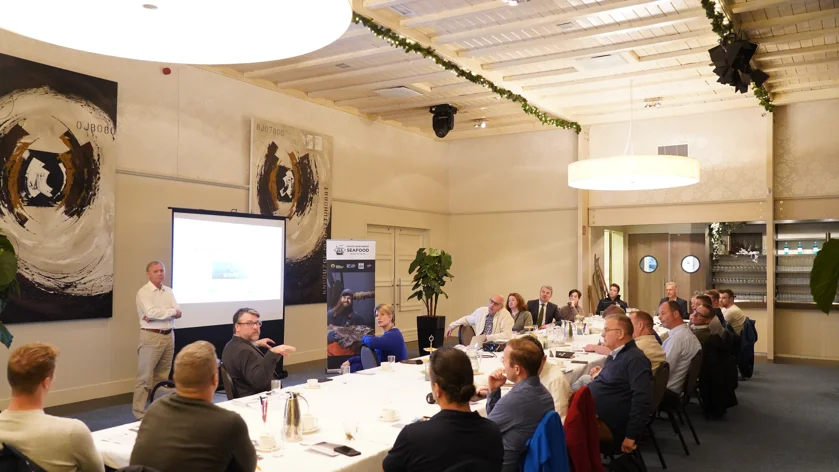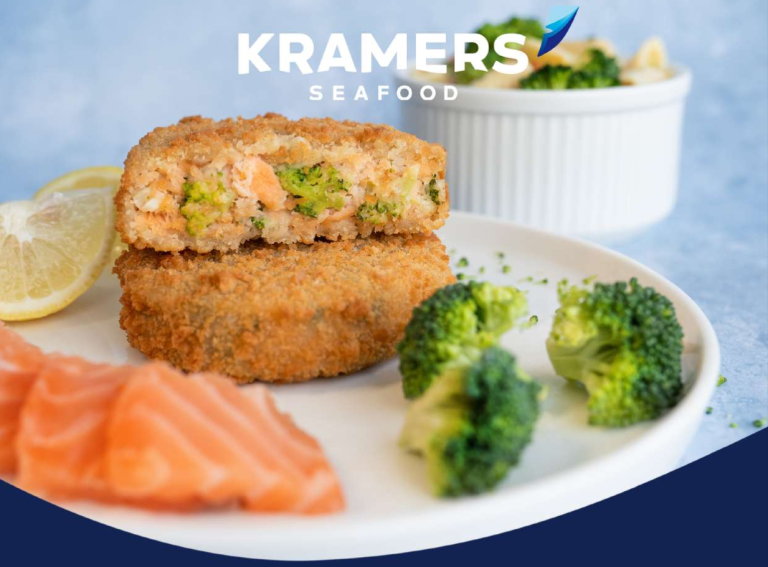Article in The Fisheries News about the Pacific Northwest meeting in Urk!
URK – The Pacific Northwest region of the United States has several fish species on offer, while the supply of sufficient raw material is becoming an increasing challenge for the European fish processing industry. A promotional event last week in Urk should bring the two sides closer together.
The meeting was organized by Pacific Northwest Seafood, together with the Agriculture Department (USDA) of the U.S. Embassy in The Hague and the Fish Federation. Pacific Northwest Seafood is a collaboration between the Oregon Department of Agriculture and the Western United States Agricultural Trade Association (WUSATA) and would like to bring lesser-known fish species from its region to the Dutch market. Attendees were welcomed last Tuesday by U.S. agricultural attaché to the Netherlands Laura Geller. In the room about 20 fishmongers, mostly from Urk but also some from outside Urk.
Fish Federation Director Mike Turenhout outlined the background against which this meeting is taking place: self-sufficiency in the European Union has fallen from 46 percent in 2014 to 33 percent last year, making the processing industry increasingly dependent on imports from third countries. For the Dutch industry, an additional factor is that the local supply of North Sea fish has declined sharply in recent years for reasons now well known.
Negotiations on the EU’s Autonomous Tariff Quotas (ATQs) are currently taking place in Brussels (an ATQ allows a certain quantity of a fish species to be imported into the EU at a reduced tariff). With the new ATQ effective Jan. 1, 2024, fish from Russia and Belarus will be excluded. The Netherlands is already a major importer of fish from the United States (ranked No. 4). Pacific Northwest Seafood could add needed volumes.
Newport
The US fishing region in question includes the coasts of the states of Washington and Oregon and the northern part of California. A region with thousands of fishermen and hundreds of fishing vessels large and small, from fishing towns like Newport, Astoria and Coos Bay. Fishing is conducted with pelagic trawls and bottom trawls, as well as standing rig and longline. Much of the fleet consists of crab, salmon and tuna vessels.
Pacific Northwest Seafood includes five major export companies from the U.S. states of Oregon and Washington. Exports are already being made to China and Japan, but exports to Europe are also on the wish list. Earlier, the organization visited the United Kingdom. As an already large importer of American fish (to the tune of 425 million euros), the Netherlands is a logical next step. Big difference between the two countries: the UK prefers portioned fish, the Netherlands mainly wants the whole fish.
Erick Garman of the Oregon Department of Agriculture and Mike Berthlet of Pacific Northwest Seafood emphasized well-managed stocks in the crisp waters of the Pacific Northwest in their presentations. Fisheries management is done at the federal, state and regional levels, involving many stakeholders, including the industry itself, science, NGO and local tribes.
Species harvested in the Northwest Pacific include Pacific sablefish (a type of pollock, also called black cod/black cod), Pacific Dover sole, the perch-like Pacific rockfish, Pacific hake and cold-water shrimp (Pandalus jordani). All listed species are MSC certified. These varieties were also served at the meeting, after being prepared by a chef from De Koningshof, where the meeting took place.
Neerlandia
Pieter Romkes of Neerlandia certainly thought it was an interesting meeting. ”At Urk we already work with Alaska plaice, rocksole and yellowfin sole, for example, but those are not the species of fish that Pacific Northwest Seafood offers. Those are really new species for us,” Romkes said. ”And certainly interesting. We’re going to work with them, with the whole industry. This meeting allowed us to explore each other and make contacts. A price indication was given, but they have yet to come up with targeted offers with prices and further information on, for example, seasons and volumes.”
For follow-up activities, Pacific Northwest Seafood will continue to work closely with the Fish Federation in the Netherlands and with the USDA office at the U.S. Embassy.



